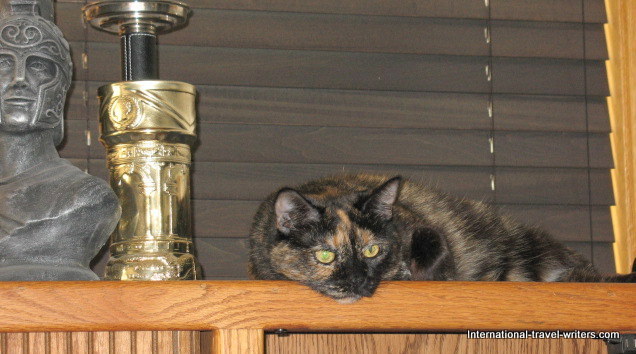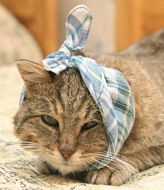Cat-astrophe ...tips how to cope with cat emergencies

Cat-astrophe is basically when your cat has an emergency. No matter how observant you are in monitoring your cat, accidents happen. When they do, it’s critical to know how to deal with them quickly and properly. On the Cat First Aid page I’ve listed items to have in your pet first aid kit such as your vet’s phone number along with the local animal poison hot-line number.
You may consider making a second kit for your car if your cat travels with you. Keep in mind, though, that while a pet first aid kit may be suitable to deal with minor cuts and wounds, it is no substitute for proper veterinary care.
The best way to deal with a cat-astrophe is to be well-educated on the interim steps prior to being able to get to the vet in order to help you eliminate panicking. If the emergency is serious, such as a car accident, you’ll need to be calm enough to take your cat for immediate medical treatment.
A very common cat-astrophe is a cat being struck by a car. If your cat is injured, be extremely careful in handling him. Cats struck by cars often suffer broken bones or internal injuries. Try to assess the situation quickly to determine the extent of injuries.
First, see if the cat is able to bear weight on all four limbs. Then check his respiratory functions. If he is breathing rapidly or taking shallow breaths, he may have bruising to the lungs or internal bleeding. Even cats that have no visible wounds may suffer internal injuries, so be sure to get your pet to a vet immediately.
Open wounds should be cleaned of dirt, and broken limbs kept in as natural a position as possible during the trip to your vet. Cats suffering from shock will show symptoms of listlessness, glassy eyes, and pale gums.
If your cat appears to be in shock wrap him in a warm towel or blanket, keep him still…and get him to the vet. If the cat is agitated or aggressive and cannot be handled, cover him with a blanket or large towel, and gently put him in a cat carrier.
In the event that he cannot move, pick him up by gently pushing both hands under the cat’s neck and rump, and place him on a blanket or in a box until you can get him medical attention.
Be very careful because the problem could be a spinal injury such as a disc extrusion or a fractured spine. Minimal movement is best when you are unsure of the nature of the cat-astrophe injury. Cats that get hit by a car will very often have a broken pelvis or a broken leg.
Broken bones and internal injuries often require surgery, which can be very costly, but sometimes doctors can treat a cat-astrophe with minor bone injuries by immobilizing him. If you cannot afford surgery, your vet may suggest this. Surgery is the ideal way to fix a broken bone but as long as the pelvis isn’t entirely crushed, there are cases where people can put their cat into a carrier and not let it out for 6-8 weeks.
This has some obvious drawbacks to accommodate feeding and elimination…and cats that heal this way may develop a limp or arthritis if the bones heal improperly, but if the funds aren’t there for surgery, at least it’s an option that may work.
Keeping your cats indoors avoids a lot of injuries. Of my 6 cats, the newest member, Giorgio, hasn't become an indoor cat yet although he's brought in frequently during the day trying to accustom him to the comforts in a house. By dinner time he's in for the night because I consider him a disaster waiting to happen. Max Factor is allowed outside for brief periods of time. A half hour in the morning and in good weather he goes out another half hour in late afternoon.
He was a stray that we took in and from day one he got claustrophobic if he didn’t have that brief outdoor time. We kept him to a brief visit outside daily and it took his anxiety away. I regret allowing him this freedom in the beginning because twice now, I’ve had vet bills due to him getting a bite wound because he’s run into a tomcat that didn’t like him. He’s neutered but if attacked he doesn’t run….unfortunately. Guess what...a cat-astrophe!
Although some cuts and wounds may seem minor, they still have to be watched for signs of infection. Cats are well-known for getting bite wounds from other cats and because their mouths contain a lot of bacteria, this can cause abscesses. These puss-filled swellings often occur around the head and at the base of the tail.
Cats that develop swelling around the neck or a fever should be treated with antibiotics. Bite wounds can cause tiny little holes, which tend to heal quickly and an infection may be trapped inside. A filled swelling around the neck or tail can be an abscess that must be drained by a veterinarian and then followed up with antibiotics.
However, Max’s recent cat-astrophe took me totally unawares. When petting him my hand came away damp and I was horrified to see a hole about the size of nickel on his left shoulder near his neck that was like raw meat. It was oozing a clear liquid so Max had obviously licked the abscess open and drained the area by himself. Yuck! I went to the cat first aid kit and got an antiseptic lotion that I applied gently.
Then we went to our vet to get the area cleaned up and get a prescription for antibiotics. I did recall that Max had a fight with a neighbor’s tomcat a couple of weeks prior and this was probably one of those cases of an infection that abscessed under the skin...the cat-astrophe.
While outdoor cats are often more prone to cuts and wounds, indoor cats in multi-cat households can also end up with scratches or bites from territorial scrapes. If you notice your cat has scruffy patches and missing fur, check his body for signs of injury and treat minor wounds by clipping away the hair in the injured area and treating the cuts with antiseptic prior to taking him to the vet.
Cover bleeding wounds with gauze or other absorbent material, and apply pressure to the injured area until the bleeding stops. The problem is when a cat gets mauled by another pet the teeth can create holes in the chest or other areas that aren’t visible. When the result is bad infections then surgery may be required.
Another cat-astrophe can happen with cats who like to play with string, tinsel or other small objects and end up eating them. Ingested toy parts often cause internal obstructions that need to be removed through surgery. Owners who notice their cat choking can try to remove the object with a pair of tweezers if it is visible and easily removed from the mouth. Attempts to remove material that is trapped in the animal’s throat can make matters worse, so be sure to call your bet immediately before attempting extreme emergency measures.
A cat with an object in its throat often needs to be sedated in order to the offending item to be removed properly. Tinsel, string, cassette tape and dental floss are big offenders. It can get caught under the tongue or cut through the intestines. One way to help your cat avoid such injuries is to make sure string-like material and small objects are out of reach unless you are watching him. Always put such toys away after play.
Chicken and turkey bones can also cause a cat-astrophe by choking or internal obstructions and should never be given to cats. If your cat is prone to pulling objects out of the garbage, use special caution. He may be digging out things that are harmful, such as medications, chemicals or other toxic substances. It’s best to dispose of garbage right away to save your cat from temptation. Ingesting other substances cause numerous cat-astrophes.
Poisoning accounts for many of the emergency room visits each year. If you think your pet has accidentally ingested medication or household chemicals, get him to the vet IMMEDIATELY. Even the smallest amount of spilled bleach, insecticide, gasoline or other household products can be harmful to a cat that has licked spilled material from his paws or fur.
Antifreeze is the big thing. Cats will
step in the substance and then try to remove it by licking at the
affected area. Medications like Tylenol and Aspirin are toxic to cats
and may have been given to the cat without the owner realizing how
dangerous it is. A good rule of thumb is to never give your cat
medications meant for humans unless your veterinarian recommends it.
If it is obvious that your cat has been poisoned and you know the type of toxin he swallowed, place the animal in a dark, quiet room and call your veterinarian or local animal poison center immediately. If possible, take the substance in its packaging with you to the vet when you take him in for medical help. This also hold true for cats that have ingested any poisonous plant. Although the list of plants is extensive, some common plants such as mistletoe, Easter lilies, and philodendrons can be highly toxic if eaten.
Call you vet immediately if you think you cat has been chewing on a toxic houseplant and try to take a sample of the plant to his office with the cat. The easiest way to avert a poisoning problem is to keep all toxic plants out of reach, medications properly stored, and clean up any chemical spills your cat may encounter.
Other cat-astrophes not so easy to control are insect bites. While most insect bites can be handled at home by removing the stinger and washing the area, owners should take note if their cat experiences breathlessness or swelling. Either could indicate that your cat is experiencing an allergic reaction and needs immediate attention. Curious or bored indoor cats can suffer burns from cooking grease, boiling water, or hot stovetops, or by coming into contact with a caustic substance unwittingly stored in a basement.
Feline Lower Urinary Tract Disease (FLUTD), caused by the blockage of the urinary tract, accounts for over 10% of all hospital admissions. Urinary infections are a big problem and are one of the more common cat emergencies. If your cat can no longer urinate or has problems with urination, get him to the vet. While it’s more common in males, FLUTD can also affect females. Details are on the webpage highlighted above. Be prepared to treat cat-astrophes and minor mishaps as soon as they happen, but remember, no amount of home treatment can adequately substitute for proper care by a veterinarian.
Related Articles......
Return from Cat-astrophes to Cat Health Homepage
Having trouble finding what you need? Cat Health Index & Site Map
OR
Do you have a question to ask?...Questions
OR
Do you have a cat story to share?...Simply click here to go to that page!
Copyright@2010-2020 All rights reserved.Cat-health-detective.com
This website is information only. Consult a veterinarian for medical assistance

"Like Us" on Facebook
or...
"Like Us" here




















